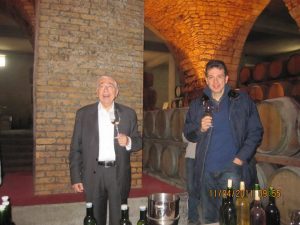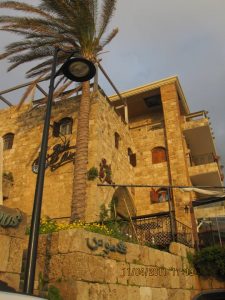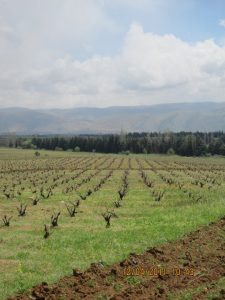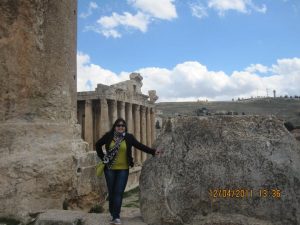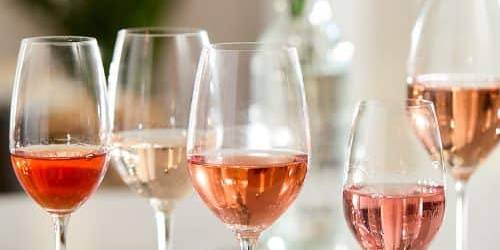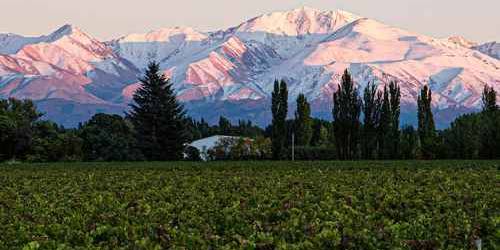by Christine Nicolson
I love trips to wine-producing countries. They enhance the picture we paint about the wine we are selling back home. Wine is mostly about the story, the people, the land, and the food. It is quite a heady mix. I still get excited about the smell that greets me when I step into a winery or simply gazing across an expanse of vineyards is a simple pleasure. It has been a while since I have toured a wine region – thanks to COVID and having small children – but as I was putting together the e-mail about our very exciting mature Chateau Musar parcel, I was transported back to my visit to Beirut in 2011.
Would I Need A Flack Jacket?
When I found out I would be going to Lebanon, I was filled with excitement but trepidation. The country is a former war zone that is still troubled, and to be honest who wouldn’t feel slightly uneasy about that? Rumours were that military checkpoints were still the norm but we were assured that we would feel safe.
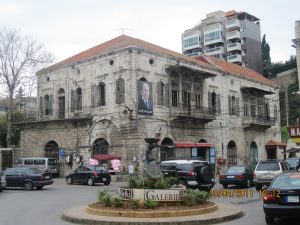
There is a military presence dotted around the city, but in reality, we could not have felt any safer in this vibrant city. We found the ‘Ashton Lane’ of Beirut and as any self-respecting young tourists should, stayed out till the small hours mingling with the incredibly attractive locals. By the way, Lebanese people in my humble opinion are ridiculously good-looking!
The days following were spent visiting an ancient grotto, seeing the famous Pigeon Rocks, and taking many pictures of bullet-ridden buildings on the outskirts of the city. The city itself is now very built up and modern but every now and again you are given a stark reminder of the crushing war that ravaged the city and surroundings. Lebanon has long been labelled as a dangerous country, but people go about their daily lives, shopping, eating, drinking, working and we felt completely safe to roam around the city and explore. Many local beers, the most delicious mezze, and trying the ‘hubbly bubbly pipes’ later, we joined the others to start the official trip to Chateau Musar.
Meeting The Hochar Family
Most of us were very familiar with the wine and had sold plenty of Chateau Musar to warrant an invitation there, so of course, shaking hands with the great Serge Hochar was like meeting someone famous. He was the man who single-handedly made Musar the brand it is today by putting his unique personality into his winemaking. He also chose to keep making wine throughout the civil war and kept the winery in Beirut going even when bombs were destroying the city. His understanding of terroir and his vision to make his wines as naturally as possible was a gamble. Today the wines reflect everything that Serge endeavored which is why they remain so popular. The history of the winery and the Hochar family is also fascinating. You can find out more here.
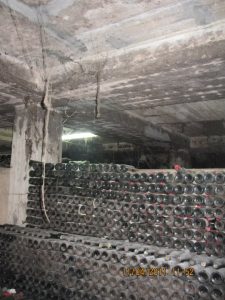
Sightseeing in Hezbollah Territory
Serge’s son Gaston was extremely hospitable and was keen to show us some of the important sights in Lebanon.
Wandering around the ancient town of Byblos perched on the Mediterranean was amazing, with its ruins of civilisations dating back to Neolithic times. Lunch went on for about four hours but we were overlooking the sea, soaking up the atmosphere and polishing off an obscene amount of Chateau Musar. We finally rolled out of Byblos only to go back to the hotel to get ready for dinner!
The next stop on our sightseeing tour was to Chateau Musar’s clay soil vineyards in the Bekka Valley, which is just over an hour from the winery in Beirut. Apart from the small and calm military presence in Beirut, we were warned that the atmosphere is slightly different when we went further inland into the Bekka. Checkpoints here were controlled by the Shiite militant group Hezbollah and we were advised to take our passports with us. As expected, at the checkpoint, we nervously handed over our passports to be checked. They were thankfully returned whilst we were being eyeballed with great suspicion.
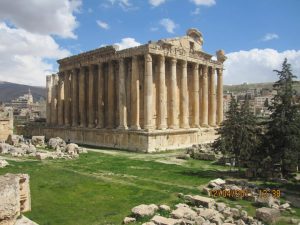
After dodging hawkers selling Hezbollah t-shirts and flags in the car park (yes Hezbollah souvenirs!) we stopped at a typical Lebanese roadside café selling warm Chicken Shwarma wraps laden with labneh. I still drool at the thought of every meal I had on that trip. It goes without saying that the food in Lebanon is simply out of this world. It has been 10 years since I went there but I have not stopped cooking and obsessing about Middle Eastern food ever since. Thank goodness for Ottolenghi!
A Tale of Two Cultures
I can see why Beirut was once referred to as the ‘Paris of the Middle East.’ The city was destroyed during the civil conflict in 1975 but through time it has re-invented itself to be a must-see destination and has become extremely cosmopolitan. Perhaps, however, unlike Paris, it is a little rough around the edges.
What struck me the most was this juxtaposition of being very Middle Eastern but also so European. As I mentioned before, its liberal sensibilities are more prevalent than other parts of the Middle East. Girls can walk down the street wearing short skirts alongside their peers wearing hijabs and you can drink beer in a bar during Ramadan. This may seem completely insignificant to many of us but I found it refreshing in a country where there at least 65% of the population is Muslim. In Lebanon, Muslim and Christians live alongside each other in relative peace albeit in a segregated fashion. It also has to be remembered that Lebanon is one of the most religiously diverse countries in the world with at least 18 different religions living together. In such a small country, that is quite remarkable.
Sadly not long after our trip, the conflicts in Syria started to spread into Lebanon and the country has had to endure more hardship. Thankfully wine is still being made and Chateau Musar goes from strength to strength. We are delighted to bring more vintages to de Burgh and we hope you enjoy drinking them!
You can browse all of our Musar vintages here
Related Posts
It’s Rose Season!
April 24, 2024
Spring is well underway and even though there's a slight chill in the air. Some sun has been making a welcome appearance. We would say that its totally FINE to start drinking Rose now. And with up to…
Amazing Argentina – Explore the wines of Argentina
February 1, 2024
Argentinian vineyards The UK has been in a lust filled, tango dancing love affair with Argentinean Malbec for a while now. After the Falklands and Jeremy Clarkson’s unique style of diplomacy…
Christmas Delivery Dates & Cut Offs
December 6, 2023
Christmas Delivery Dates & Cut-Offs LAST ORDERS FOR UK-WIDE DELIVERY FOR CHRISTMAS IS MONDAY 18TH DECEMBER. We will be out delivering in our own vans too, so please get in touch to avoid…


